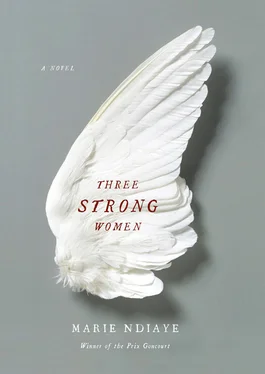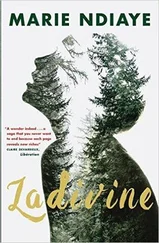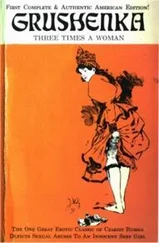He only went out to take his son for walks and to shop as close to home as possible, convinced that everyone was aware of his fall from grace and was laughing at him.
Wasn’t it at that point too, he wondered, that he’d begun to dislike the child in a way he’d never owned up to and would indeed have hotly denied?
• • •
He set off and drove to the edge of the village.
He parked on a dirt track between two fields of corn, and without getting out began devouring the bread and ham, taking a bite first of the one and then the other.
Although the ham was watery and tasteless and the baguette limp, it was so good to be eating something at last that his eyes filled with tears.
But why, oh why, had he never been able to feel for Djibril the obvious love, so strong, joyous, proud, that other fathers seemed to feel toward their children?
He’d always made an effort to love his son, and that effort, previously disguised by his eagerness to please and the shortness of time actually spent with the boy, had been exposed during the long weeks he spent shut up in the apartment.
He’d have preferred then to hide away from everybody, but Djibril was there, always there, a witness to Rudy’s downfall, to his degradation and the destruction of everything he’d done to make himself a man beloved and respected.
That the boy was only two made no difference.
This little angel had become his fearsome, watchful guardian, the silent, mocking judge of his fall from grace.
Rudy crumpled up the wrapping paper from the ham, tossed it in the back, and ate the rest of the bread.
Then he got out of the car and went toward the first row in the cornfield to urinate.
Hearing a wingbeat, the gentle flutter of feathers in the warm, still air above his head, he looked up.
As if on cue, the buzzard dived toward him.
He raised his arms to protect his head.
Just before touching him the buzzard swerved away, shrieking with rage.
Rudy jumped in the car, reversed out of the dirt track, and drove slowly along the road.
Although when he’d finished eating he’d been ready to go back home and see Fanta, he was now gripped with fear and irritation, so he deliberately went in the other direction.
The idea crossed his mind that the bird had perhaps been trying to tell him that he should indeed go back home as quickly as possible, but he rejected it, convinced deep down that the angry buzzard was, on the contrary, indicating that he should stay well away.
He felt his head throbbing.
“What for, Fanta, what for,” he murmured.
Because wasn’t he, in a sense, now worthier of being loved than he had been that morning?
And being on that lofty perch from which she could launch an attack bird that enjoyed her full support, could she not understand that?
Just as he would never again say those absurd, cruel things he’d uttered only in the white heat of anger, the same way as he would no longer let himself fall prey to a particular kind of humiliating, impotent, comforting rage, he would try no more to charm Fanta with seductive guile, because those things he said in the apartment in Le Plateau hadn’t been intended to get at some honest truth or another but only to drag her back to France with him even at the risk (not considered at the time, almost beyond his concern) of her own downfall and the collapse of her rightful dreams.
He recalled the gentle, persuasive tones he’d managed to infuse into his voice, he who, after a month spent alone with Djibril, spoke only in a sort of hesitant croak. Then, even when Fanta came home in the evening, he felt too weary to utter more than a few words.
Quietly happy just to be back once more with her child, she took over with discreet alacrity from Rudy, even though they both knew that he hadn’t had to do very much, and she busied herself so energetically with the toddler that Rudy could pretend there was no opportunity to get a word in.
He would feel relieved and would go out and lean on the balcony, watching the sun set over the placid avenue.
Big gray or black cars were bringing home businessmen and diplomats who would pass a few servant girls returning on foot carrying plastic bags, and those women who didn’t pad wearily along flew above the pavement just as Fanta still did, seeming not to touch the ground except to use it as a springboard.
Then, sitting on opposite ends of the table, they’d eat the meal Rudy had prepared, and since by then Djibril had been put to bed, they could feign wanting to listen to the news on the radio and not have to speak to each other.
He would gaze furtively at her sometimes: at her small, shaven head, the harmonious roundness of her skull, the casual grace of her movements, her long slender hands, which, at rest, hung at right angles to a wrist that was so slender it looked as if it would snap easily, and her serious, thoughtful, conscientious air.
He was overwhelmed with love for her, but he felt too tired and depressed to show it.
Perhaps in some obscure way, too, he resented her for bringing home the daily action and images of a lycée he was no longer in touch with, her free movement in a scene from which he’d been excluded.
Perhaps, in some obscure way, he was insanely jealous.
Early on in his suspension, when he was supposed to be on sick leave only, he used to listen glumly to tidbits of news she thought would interest him, about colleagues and pupils and this and that; he’d gotten into the habit of leaving the room at that point, this evasion as effective an interruption as if he’d hit her in the mouth.
Wasn’t it to avoid doing precisely that, that he’d walk out of the room?
But once he’d been informed of the panel’s verdict — dismissal from his post and loss of his teacher’s certificate — he’d recovered the gift of smooth talking and put it at the service of his unhappiness, dishonesty, underhandedness, and envy.
He’d assured her that it was only in France that they had a future, and that through her marriage to him she was lucky to be able to go and live there.
As for what she’d do there, no problem: he’d make it his business to get her a job in a middle school or a lycée.
He knew nothing was less likely, and yet his tone became all the more eloquent as he started to be assailed by doubts, and Fanta, being naturally honest, never suspected anything, perhaps particularly because he’d reverted to his former guise of the young man in love, the fiancé with the cheerful, tanned face and pale blond forelock that he tossed back with a puff of breath or jerk of the head, so that even if Fanta knew some people whose faces were adept at dissembling and lies, whom she therefore would never have trusted, behind that loving, tanned, open face, those eyes so limpid and pale, surely nothing could be concealed.
They’d spent long days visiting members of Fanta’s extended family.
Rudy had remained on the threshold of the green-walled apartment where, a few years earlier, he’d first met the uncle and aunt who’d raised Fanta.
His excuse for not entering was that he felt unwell, but in truth he couldn’t bear to look those two old people in the eye, not because he feared his lying mask would be torn off but rather because he was afraid of betraying himself and — standing in that greenish-blue room beside Fanta as she talked in proud, confident, determined tones about all the good things that awaited them over there — of being tempted to drop everything, to say to her, “Oh, they won’t give you a teaching job in France,” and of finally telling her about the crime Abel Descas had committed long ago and about the way he’d died, about why the boys had thrown him, her husband, to the ground, because Fanta, while not believing he’d insulted the pupils exactly as people said, must have thought he’d shown them some kind of disrespect or another.
Читать дальше












